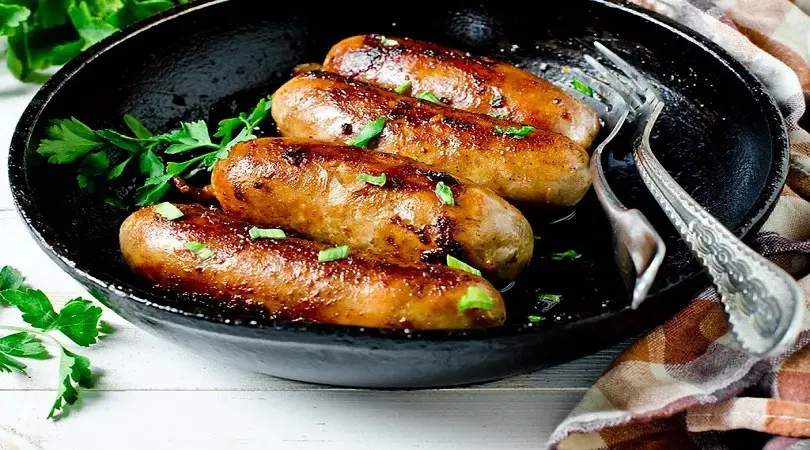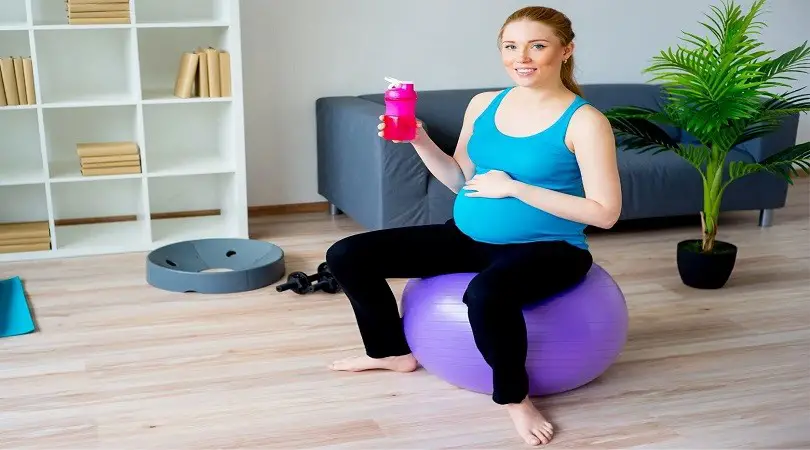Last Updated on January 6, 2025
Yes, you can eat vienna sausages while pregnant, but it is important to consume them in moderation.-vienna sausages are safe for pregnant women as long as they are consumed in moderation. They are a convenient source of protein and can be enjoyed as part of a balanced diet.
However, it is essential to be mindful of the sodium content, as excessive intake of sodium can lead to water retention and high blood pressure. Therefore, it is recommended to read the nutrition labels and choose low-sodium options. Additionally, pregnant women should always consult with their healthcare provider or nutritionist before making any dietary changes to ensure they are meeting their individual nutritional needs.

Credit: eatpallet.com
Related: Can You Have A Colonoscopy While Pregnant?
Understanding The Safety Of Vienna Sausages During Pregnancy
The Debate: To Eat Or Not To Eat?
Vienna sausages are a popular choice for quick and convenient meals. However, when it comes to pregnancy, it’s important to consider the safety of what you eat. Let’s dive into the debate surrounding vienna sausages during pregnancy.
Nutritional Composition Of Vienna Sausages
Vienna sausages pack a punch when it comes to their nutritional composition. Here are some key points to consider:
- Vienna sausages are a good source of protein, which plays a vital role in the growth and development of your baby.
- They also contain essential vitamins and minerals like b vitamins, zinc, and iron, which are important for overall health.
- However, it’s important to keep in mind that vienna sausages are also high in sodium and fat, which may not be as beneficial during pregnancy.
Food Safety Concerns And Pregnancy
During pregnancy, food safety is paramount to ensure the health and well-being of both you and your baby. Here are some considerations when it comes to vienna sausages:
- The main concern with vienna sausages is their potential for contamination with harmful bacteria such as listeria. This bacteria can cause a serious infection that may lead to miscarriage, premature birth, or illness in the newborn.
- To minimize the risk of contamination, it’s important to ensure that the sausages are properly cooked and heated to an internal temperature of 165°f (74°c).
- Additionally, pregnant women should avoid consuming vienna sausages that have exceeded their expiration dates or have been stored improperly.
- It’s also advisable to opt for reputable brands and ensure that the sausages are properly sealed and stored in the refrigerator prior to consumption.
While vienna sausages can offer nutritional benefits during pregnancy, it’s crucial to prioritize food safety. Paying attention to cooking temperatures, expiration dates, and proper storage can help minimize potential risks. Ultimately, it’s best to consult with your healthcare provider for personalized advice regarding the consumption of vienna sausages during pregnancy.
Stay safe and enjoy a healthy diet for you and your little one!
Potential Risks Associated With Consuming Vienna Sausages
When it comes to pregnancy, it’s important to pay attention to your diet and make wise food choices. This includes being cautious about the types of processed foods you consume. Vienna sausages, although convenient and tasty, may pose some potential risks for pregnant women.
Let’s take a closer look at these risks and understand why moderation is key.
Sodium Content And Blood Pressure
High sodium intake during pregnancy can lead to an increase in blood pressure, which can be detrimental to both you and your baby’s health. Vienna sausages, like many processed meats, tend to be high in sodium. Here are the key points to keep in mind:
- Excessive sodium intake can contribute to water retention and swelling, commonly experienced by pregnant women.
- High blood pressure during pregnancy, also known as gestational hypertension, can increase the risk of complications such as preeclampsia.
- Preeclampsia can negatively impact both the mother and the baby, potentially leading to premature birth, growth restriction, and other health issues.
- It is essential to monitor and manage your sodium intake throughout pregnancy to maintain healthy blood pressure levels.
Nitrites And Nitrates: A Cause For Concern?
Nitrites and nitrates are common additives found in processed meats like vienna sausages. These chemicals are used to preserve the meat, prevent bacterial growth, and enhance its color. However, excessive consumption of nitrites and nitrates can have adverse effects on pregnancy.
Consider the following:
- Nitrites and nitrates can react with substances in the stomach to form nitrosamines, which are potential carcinogens.
- Prenatal exposure to nitrosamines has been linked to an increased risk of certain childhood cancers.
- Nitrite consumption during pregnancy has also been associated with an increased risk of certain birth defects, such as oral clefts.
- While the evidence is not conclusive, it is best to limit exposure to nitrites and nitrates during pregnancy as a precautionary measure.
Additives And Preservatives: Their Impact On Pregnancy
Vienna sausages often contain various additives and preservatives to enhance flavor, prolong shelf life, and maintain their appearance. While these additives are generally considered safe for consumption, it is essential to be aware of their potential impact on pregnancy. Here’s what you should know:
- Some additives used in processed foods may cause allergic reactions or intolerances that could be harmful during pregnancy.
- Preservatives, such as sulfites, are commonly used in processed meats and can trigger allergic reactions or asthma symptoms in some individuals.
- It is advisable to read labels carefully and choose sausages with minimal additives and preservatives.
- Opting for fresh, unprocessed meats and preparing them at home allows you to have better control over the ingredients and additives.
While consuming vienna sausages occasionally may not pose significant risks, it is crucial to be mindful of their high sodium content, the presence of nitrites and nitrates, and the impact of additives and preservatives on pregnancy. Maintaining a balanced diet that includes plenty of fresh and minimally processed foods is always the best approach for a healthy pregnancy.
Related: Can You Get A Hydrafacial While Pregnant?
Making Safe Choices: Recommendations For Consuming Vienna Sausages
Vienna sausages are a popular and convenient choice for many individuals, including pregnant women. However, when it comes to consuming these sausages during pregnancy, it’s essential to make safe choices to ensure the health and well-being of both the mother and the baby.
Here are some recommendations to keep in mind:
Opt For Low-Sodium Or Sodium-Free Varieties
When selecting vienna sausages for consumption during pregnancy, it’s advisable to opt for low-sodium or sodium-free varieties. High levels of sodium can increase the risk of water retention and high blood pressure, which can be detrimental to both the mother and the baby.
Look for packages that indicate lower sodium content or specifically state that they are sodium-free.
- Choose low-sodium or sodium-free varieties to minimize the risk of water retention and high blood pressure.
- Read the labels carefully and look for specific indications of low sodium content or sodium-free options.
- Keep in mind that reducing sodium intake is beneficial for overall health, not just during pregnancy.
Look For Nitrate-Free Options
Another important consideration when consuming vienna sausages during pregnancy is the presence of nitrates. Nitrates are commonly used as preservatives in processed meats, including sausages, but excessive intake can pose health risks. To reduce exposure to nitrates, opt for nitrate-free vienna sausages whenever possible.
- Check the packaging for indications of nitrate-free options.
- Select sausages that explicitly state they are free from nitrates.
- Nitrate-free sausages can provide peace of mind and minimize potential risks associated with excessive nitrate consumption.
Avoid Sausages With Unnecessary Additives
To ensure the safety of both the mother and the unborn baby, it’s essential to avoid sausages with unnecessary additives. Some sausages may contain additives such as artificial colors, flavors, and preservatives that could potentially have adverse effects on health.
Opt for sausages with minimal ingredients and avoid those with additives that are not essential.
- Read the ingredient list carefully and choose sausages with minimal additives.
- Avoid sausages that contain artificial colors, flavors, and unnecessary preservatives.
- Opting for sausages with a more natural ingredient profile can provide peace of mind during pregnancy.
Remember, when enjoying vienna sausages during pregnancy, always prioritize safety and make informed choices. By opting for low-sodium or sodium-free varieties, looking for nitrate-free options, and avoiding sausages with unnecessary additives, you can confidently include vienna sausages in your diet while pregnant.
As always, consulting with your healthcare provider is recommended to ensure that these choices align with your specific nutritional needs and overall health.
Exploring Alternatives: Healthy Snack Options During Pregnancy
During pregnancy, it’s important to maintain a healthy diet that provides essential nutrients for both you and your baby. While vienna sausages may be a tempting snack option, you may wonder if they are safe for consumption during pregnancy. Let’s explore some healthier alternatives and nutritious snacks that can keep you satisfied and nourished throughout this special time.
Homemade Protein Snacks: A Healthier Alternative
When it comes to snacking during pregnancy, homemade protein snacks can be a great option. These snacks are not only tasty but also packed with nutrients that support your baby’s growth. Here are some ideas for homemade protein snacks:
- Boiled eggs: A great source of protein, boiled eggs are quick and easy to prepare. They also provide essential vitamins and minerals like choline, which is important for your baby’s brain development.
- Greek yogurt with fruits and nuts: Greek yogurt is rich in protein and calcium, making it an excellent choice for a healthy pregnancy snack. Add some fresh fruits like berries and a sprinkle of nuts for added nutrients and crunch.
- Hummus and vegetable sticks: Whip up a batch of homemade hummus using chickpeas, tahini, garlic, and lemon juice. Pair it with colorful vegetable sticks like carrots, celery, and bell peppers for a nutritious and satisfying snack.
- Protein balls: Make your own protein balls using ingredients like oats, nut butter, honey, and seeds. These bite-sized snacks are not only delicious but also provide a good amount of protein and energy.
Filling And Nutritious On-The-Go Snacks
Pregnancy can be a busy time, and you may find yourself needing snacks that are convenient and easy to grab on the go. Here are some filling and nutritious options for on-the-go snacking:
- Fresh fruit: Fruits like apples, bananas, and oranges are not only portable but also provide important vitamins, minerals, and fiber. Carry them with you for a quick and refreshing snack.
- Nuts and seeds: Almonds, walnuts, pumpkin seeds, and chia seeds are all excellent sources of healthy fats, protein, and fiber. Keep a small pack handy in your bag for a satisfying and nutritious snack on the go.
- Whole grain crackers with cheese: Opt for whole grain crackers that provide fiber and pair them with a slice of cheese for added protein and calcium. This combination makes for a filling and nourishing snack option.
- Vegetable and cheese wraps: Fill whole grain wraps with a variety of colorful vegetables and a slice of cheese. It’s a delicious and convenient way to incorporate nutritious ingredients into your snacking routine.
Seeking Professional Advice For Diet Planning
While these snack options are generally considered safe and healthy during pregnancy, it’s essential to consult your healthcare provider or a registered dietitian for personalized advice. They can help you create a diet plan that caters to your specific nutritional needs and any dietary restrictions or cravings you may have.
Prioritize your health and well-being by ensuring your diet choices align with expert recommendations.
Remember, your diet during pregnancy plays a crucial role in the development and well-being of your baby. By opting for homemade protein snacks, filling on-the-go options, and seeking professional advice, you can make informed choices that nourish both you and your little one.
Happy snacking!
Related: Can You Get Pregnant From Being Fingered?
Frequently Asked Questions On Can I Eat Vienna Sausages While Pregnant?
Can I Eat Vienna Sausages While Pregnant?
Vienna sausages can be consumed in moderation during pregnancy, but it is best to consult with your healthcare provider for personalized advice.
Are Vienna Sausages Safe For Pregnant Women?
Vienna sausages are generally safe for pregnant women to eat as long as they are cooked thoroughly and consumed in moderation.
What Are The Risks Of Eating Vienna Sausages During Pregnancy?
While there are no major risks associated with eating vienna sausages during pregnancy, they are processed foods that may have high sodium and preservative content.
Can Eating Vienna Sausages Harm My Baby During Pregnancy?
Eating vienna sausages in moderation is unlikely to harm your baby; however, consuming them excessively may contribute to an unhealthy diet.
What Are Some Healthier Alternatives To Vienna Sausages For Pregnant Women?
If you’re looking for healthier options, consider lean meats like chicken or turkey, fish, beans, lentils, tofu, or homemade sausages using fresh ingredients.
Conclusion
Overall, while vienna sausages may be a convenient and tasty snack option, pregnant women should exercise caution when consuming them. It is important to consider the potential risks associated with these processed meats. The high sodium and nitrite content may have adverse effects on both the mother and the developing baby.
Pregnant women should prioritize consuming fresh, unprocessed meats and opt for lean protein sources instead. Additionally, it is crucial to discuss any dietary concerns or questions with a healthcare provider. They can offer personalized advice and guidance based on individual health factors and nutritional needs.
Remember, the health and well-being of both the mother and the baby are of utmost importance during pregnancy, and making informed choices about food consumption plays a crucial role in ensuring a healthy pregnancy journey.











